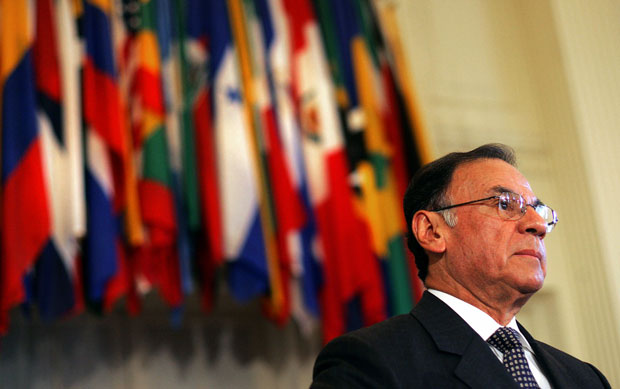South American Union’s Left Turn Is Bad News
Ray Walser /

Venezuelan Ali Rodriguez, recently chosen to lead the Union of South American Nations as Secretary General
In a ceremony in Bogota on June 11, the position of Secretary General of UNASUR passed from Colombian Maria Emma Mejia to Venezuela’s Ali Rodriguez. An ex-Marxist guerrilla, former foreign and energy minister, and former Ambassador to Cuba, the anti-American Chavista will serve as General Secretary for the next year.
The Union of South American Nations (UNASUR) is an inter-governmental organization created in 2008 to foster unity and integration among the 12 states of South America. It has a broad range of responsibilities and a $20 million budget.
UNASUR also established an electoral council, among several advisory groups, which it promises will defend and advance democracy. According to UNASUR, the first task is to witness (“accompany”) the electoral process in Venezuela. On October 7, the ailing Hugo Chavez will seek another six-year term as president, a position he has occupied since 1999.
UNASUR, however, has no track record in electoral observation and will surely, under Rodriguez’s tutelage, seek to position itself as a presumably impartial body of peers able to legitimate what the forces of the Left hope will be Hugo Chavez’s triumphant reelection. By turning to UNASUR for cover, the Chavez regime can distance itself from more impartial electoral observer groups such as one led by the Organization of American States (OAS).
The goal of Venezuela and its allies within UNASUR is to implement a definitive shift away from the present inter-American arrangement where considerable clout still resides with independent OAS officials, nongovernmental organizations, and civil society. The shift would be to a regional body—minus the U.S. and Canada—in which long-serving, authoritarian-minded executives (like Chavez) and their loyalists are better able to set political agendas and self-legitimate their acts by firewalling them against domestic and international criticism.
For the coming year, under a Chavista leader, UNASUR will become a preferred vehicle for parties intent on dismantling the OAS and countering U.S. interests and influences in South America. Under Rodriguez, fresh efforts can also be anticipated to insert UNASUR into Colombia’s decades-old conflict with the Revolutionary Armed Forces of Colombia (FARC) to advance “peace talks” and restore lost legitimacy to a murderous band of narco-terrorist thugs.
Venezuela and Ali Rodriguez can neither dominate the entire spectrum of South American relations nor act freely without the consent of UNASUR’s more democratic members, but there is plenty of room for harm. South America’s move toward closer political and economic integration may be inevitable. However, putting UNASUR in the hands of a militant, anti-American Chavista whose primary goal will be to steer UNASUR in the direction of Chavez’s Bolivarian Revolution is definitely a turn in the wrong direction.
